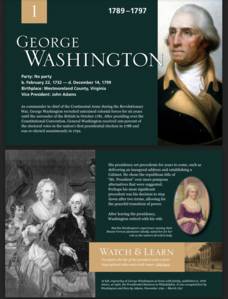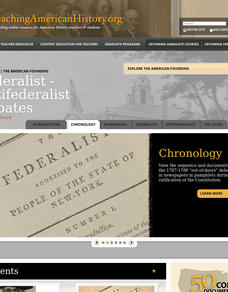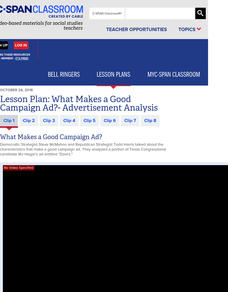Stanford University
The 1898 North Carolina Election
Pupils discuss why the Democrats defeated the Fusion ticket in the 1898 North Carolina election. In this content area reading instructional activity, learners explore three primary documents and answer guiding questions that help them...
Curated OER
Close Encounters of the World Kind
Explore the vocabulary of the government process. Using a simple technique, learners discuss the meaning of the words majority, election, democrat, republican, and independent. This can be used as an anticipatory set.
Constitutional Rights Foundation
Elections, Money, and the First Amendment
Those who spend the most, win. Academics read informational text, participate in group discussion, and defend campaign reforms to understand the correlation between money, the First Amendment, and election results. The resource explains...
Carolina K-12
Political Parties and Conventions
The two major parties polarize many in America today, but it doesn't have to be that way in the classroom! Teach learners about political party platforms and modern campaigns with a mock political convention. After watching a PowerPoint...
C-SPAN
Virtual Presidents Exhibit
Scholars get a glimpse into the lives of all 46 Unites States presidents. An engaging timeline details each president's background and time in office. LInks send pupils to a website with more in-depth information.
Curated OER
Party Like It's 1992 or '84 or '76 or '68!
Students explore, analyze and study how political party platforms have changed over time. They create a party platform time line by researching Republican and Democratic Party stances on various issues during the last few decades.
Curated OER
Populism and the People’s Party
Students examine the history of the Populist Party as it relates to its reforms and economic plight. In this Populism and the People's Party instructional activity, students explore why farmers experienced financial difficulty at the end...
Encyclopedia Britannica
Becoming US President
It's that time of year, and the year. Once again the race is on for the White House. It's important that young voters, and would-be voters, understand the process for becoming the United States President. Class members research the...
Curated OER
Elections - Mobilization Versus Suppression
Students analyze voter suppression. In this voting practices lesson, students listen to their instructor present a lecture comparing voter suppression and voter mobilization. Students respond to the provided discussion questions.
Curated OER
Lose a Vote, Gain a Vote
Students explore the issues behind close Senatorial races. They investigate the qualities of political leaders, the 2002 senatorial elections and the differences and similarities between the Republican and Democratic parties.
Curated OER
Power, Persuasion & Propaganda: Exploring Multiple Motives
Students recognize different motives even in non-commercial media. They analyze the role of media in a democratic society and wrestle with ethical issues concerning media and the public good. They create a media message with one or more...
iCivics
Voting in Congress
In a role-play activity acting as members of either the Senate or House of Representatives, class members will vote on bills to halt mail delivery on Saturdays in the United States and to raise the minimum wage. Through an included...
Ashbrook Center at Ashland University
Federalist - Antifederalist Debates
Who should have the power—individual states or the federal government? Scholars research the arguments of the Federalists and Anti-Federalists during the formation of the United States Constitution. Online resources, including a vast...
Curated OER
Secession Crisis: In Two Virginia Communities
Students are divided into groups and are assigned newspaper articles from the year 1861. The articles are from either Republican or Democratic parties discussing the Virginia secession. They complete worksheets and have a whole class...
Curated OER
Political Party Development
Learners complete a Venn Diagram comparing the Democratic Republicans and the Democratic Party today. In groups, they research the key concepts of the Democratic Party today and write a short summary. They share their ideas and...
Curated OER
Attitudes About Slavery in Franklin County, Pennsylvania
High schoolers examine the historical attitudes towards slavery in Pennsylvania. They read transcriptions from two Pennsylvania newspapers and compare/contrast the county's Republican and Democratic Parties' positions on slavery.
Curated OER
Cartoons for the Classroom: Campaigns and Gas Pains
Even before they are driving, your scholars have heard the ups and downs of gas prices. Assess the political turmoil behind rising prices using this analysis handout, which features a political cartoon from 2006. Background information...
PBS
The Roosevelts: An Intimate History—Snapshot Lessons
The Roosevelt family was one of the most influential and prominent political forces in the 20th century, leaving behind a wide-ranging legacy of conservation, progressivism, and economic growth. Learn more about President Theodore...
C-SPAN
What Makes a Good Campaign Ad?- Advertisement Analysis
In the time of a hotly contested presidential election, campaign ads are almost ubiquitous—but what makes them good? Using ads from the 2018 midterm elections, learners consider the various strategies candidates use to get the vote....
Curated OER
Early Presidents
Students are introduced to the lives and contributions of the first seven presidents of the United States. They, in groups, conduct further research on one of these president and his political platform and design a presentation for the...
Curated OER
Sentence Completion 17
These words are tough! Very advanced English language learners or native speakers will still be befuddled by some of these vocabulary words. For each of the six sentences provided, learners must choose the correct word to complete the...
Student Handouts
Voting Rights Speech Before Congress
Is your class studying civil rights? Consider taking a look at President Lyndon B. Johnson's voting rights speech. This resource includes an abridged version and three related questions. Pupils consider Johnson's use of language and the...
PBS
What Are the Primaries and Caucuses?
What are the essential differences between primaries and caucuses? As part of a study of the process by which Americans select their candidates for US president, class members examine the nominating process, the changes that have...
Curated OER
Political Issues and Opinions
The emergent adults in your US Government class can become informed, self-aware voters. This activity enables them to form an opinion about particular political issues then identify themselves on the political spectrum. Informed and...

























